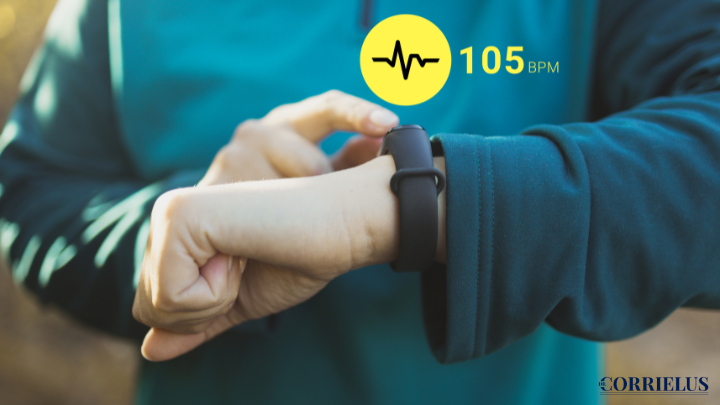Maintaining a healthy heart is a crucial part of fitness. Whether you’re exercising or resting, keeping track of your heart rate can help you stay on the right path toward good heart health. In this blog, we will cover everything you need to know about heart rate zones, how to monitor your heart rate, and how these factors can improve your overall fitness.
The Connection Between Your Heart Rate and Fitness
Heart health is more than just about your exercise routine—it’s about knowing how to listen to your body. When your heart rate is within the right zone, your body is working efficiently. If your heart rate during exercise is too high or too low, it can mean that your body is not getting the full benefit of the workout.
Tracking your heart rate during exercise with a heart beat monitor can help ensure that you’re pushing yourself just enough. But why is it so important? Here’s why:
- Heart health: A healthy heart makes it easier to stay fit and feel good.
- Tracking heart rates: Knowing the number of beats per minute (bpm) helps gauge if your workouts are effective.
- Exercise efficiency: Getting your heart rate during exercise in the right zone means better calorie burn and muscle strength.
When Your Heart Beats Too Fast: The Risks of a Fast Heart Rate
Having a fast heart rate during exercise can be a sign of overexertion. When your heart rate increases beyond normal limits, it could indicate that your body is under stress.
Fast heart rate may lead to these concerns:
- Dehydration: Your body loses fluids quickly, leading to quicker exhaustion.
- Increased heart rate: A higher-than-normal heart rate for a long period can harm your heart health.
- High resting heart rate: Having a high resting heart rate is a sign that your body is not recovering properly.
If your heart rate during exercise is too high, it may be time to lower the intensity and focus on slowing down. A good rule of thumb is not to push your heart rate too high for extended periods.
Your Normal Heart Rate: Finding the Perfect Balance
A normal heart rate varies for each individual, depending on age and fitness level. However, there are general guidelines you can follow to make sure you are in the right zone.
Normal Resting Heart Rate
Your normal resting heart rate is the number of times your heart beats per minute while you are at rest. The average normal resting heart rate for adults is between 60 and 100 bpm. However, trained athletes often have a lower normal resting heart rate because their hearts are more efficient.
Heart Rate Zones
When it comes to exercise, you can break your heart rate into different zones to maximize your workouts. Here are the main zones:
- Resting Zone (50–60% of maximum heart rate): This is where your body recovers.
- Fat-Burning Zone (60–70% of maximum heart rate): Your body burns fat more efficiently.
- Cardio Zone (70–85% of maximum heart rate): Great for improving cardiovascular fitness.
- Peak Zone (85%+ of maximum heart rate): This zone increases strength and endurance.
The maximum heart rate calculator can help you determine the top heart rate zone for your age. The simplest formula to calculate your maximum heart rate is:
220 – your age = Maximum Heart Rate
Why Tracking Your Heart Rate During Exercise Is Key
One of the best tools for monitoring your heart rate is a heart beat monitor. This device helps you keep track of how hard your heart is working during your workouts. It’s important to know your heart rate during exercise because:
- Avoid overtraining: With the right heart rate, you can avoid the risk of overworking your heart and muscles.
- Improved fitness: By staying in the right zone, your body gets the most from each workout.
- Prevention of injury: If your heart rate is too fast or too slow, your muscles may not be getting enough oxygen, leading to injuries.
Managing Your Heart Rate After Exercise
After your workout, your heart should return to its normal heart rate. If it takes too long to return to a normal resting heart rate, it could be a sign of poor fitness or that your body is overworked. The key to better fitness is a healthy balance between pushing yourself and giving your body time to recover.
Things to Consider
- High resting heart rate: A higher than usual resting heart rate can suggest that your body is under stress or lacks fitness.
- Increased heart rate: If your heart rate during exercise stays elevated for too long, it could be harmful.
- Recovery: A good recovery period helps your heart return to its normal resting heart rate more quickly.
A word from the Doctor —
Being aware of your heart health and knowing how to control your heart rate zones is vital to improving your fitness. Use tools like a heart beat monitor to track your progress and adjust your workout routine. Keep an eye on both your normal heart rate and heart rate during exercise to make sure you are working in the optimal zones for maximum fitness benefits.
Schedule a consultation with Dr. Sanul Corrielus right away if you have questions about your heart health!



